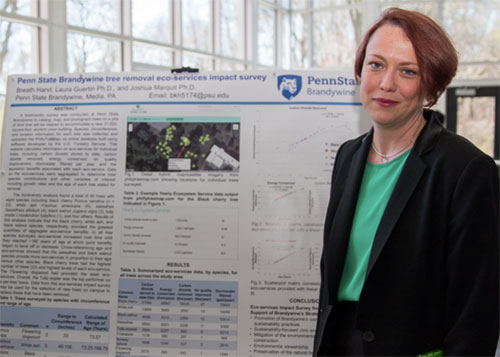Policy Student’s Op-Ed Leads to Recycling Program Grant
By Rajitha Penaka ’22
December 07, 2020
Breath Hand, MS environmental policy ’21, knew from the early years of adulthood that every action she took in favor of the environment would help counteract the daunting effects of climate change and global warming. Studying environmental policy at Drexel was one of those actions.

As a second-year student in the program, she decided to use her education at the intersection of policy, communication and the environment to create positive change in her community. Hand submitted an opinion article to her hometown newspaper in Arkansas to share and contextualize the successes of the Stone County Recycling Program. Inspired by her Drexel course on grant writing with communication professor Dierdre McKee, Hand hoped to raise awareness of the program and encourage participation amid the COVID-19 pandemic.
The op-ed was published in the Stone County Leader in August. By September, she learned that the town’s mayor, Roger Gardner, had read the letter — and made a big commitment as a result.
She says, “The mayor read out portions of the letter in a city council meeting. During this meeting, the city ended up unexpectedly agreeing to approve a $20,000 diversion credit to the recycling center, retroactive to March.”
Seeing the results of her action, Hand felt further motivated to continue her efforts in environmental communication.
“I teared up. It made me have a sense of hope. I felt it in my gut,” she says. “This grant could lead to future developments that could be incredibly important for the recycling program; if my letter helped in any small way, then I’m really encouraged.”
Hand also maintains an informative climate change blog called “¿kalamity del mundo?,” meaning “disaster of the world” in Spanish. There, she shares thoughts and resources about how to help further prevent climate change and promote topics such as conservation, biodiversity and social justice.
These interests are what originally led Hand to the Drexel environmental policy master’s program, which emphasizes equity as a goal for environmental policy. Students in the program are taught to see all sides of controversial issues, collaborate effectively and communicate complex information in an accessible way.
“I really appreciate the cross-discipline aspect of the program,” Hand says. “I was looking for a graduate program that would give me a deeper understanding of ways in which to go about helping the environment, particularly in the U.S.
“Saving the environment is going to take a multidisciplinary approach. This major also allows me to focus on communication. I want to turn science into a language that everyone can understand.”